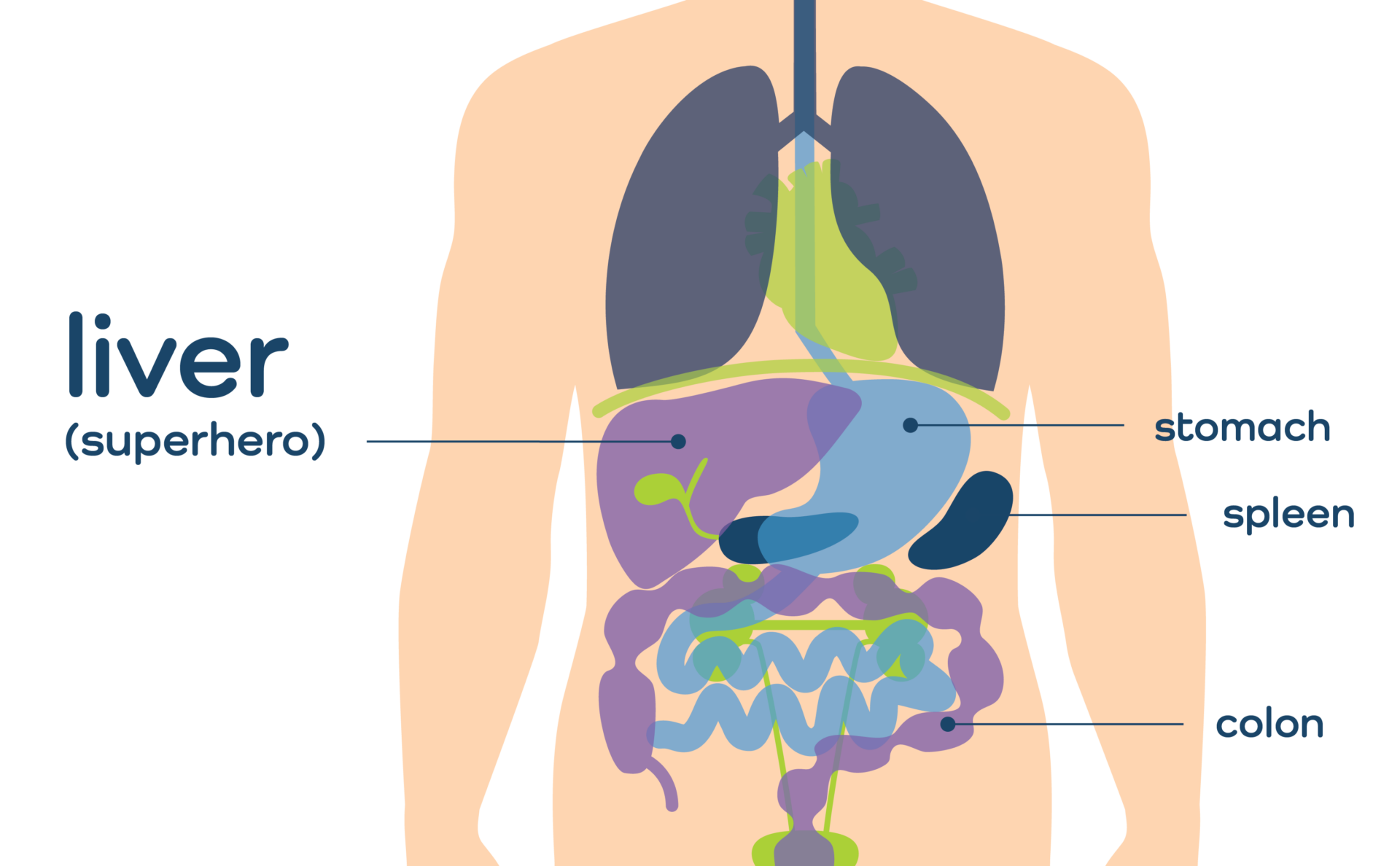You need your
liver to live
The liver is a powerhouse organ – and one that should be celebrated for its superhero strength!

The liver is a powerhouse organ – and one that should be celebrated for its superhero strength!

The liver is your body’s largest internal organ, weighing about 3 to 3.5 pounds (we like to say it’s the size of a rugby ball), and is one of the most important organs in the body. It’s located on your right side, just under your rib cage.
Your liver’s top job is to clean the body, and it’s essential to your life.

In fact, the liver performs over 500 daily functions that are vital to life. Here are a few of them:
Your liver is a resilient and determined organ – might we even say it’s the body’s top performer?! – and it will continue work even when it’s two-thirds damaged. It’s also the only organ in the human body that can regenerate itself.
Because of its wide-ranging responsibilities and exposure to the gut, poisons in food, and bacteria, a healthy liver can come under attack from viruses, contaminants, infections, toxic substances, and other factors. Continual exposure to these “attackers” can cause inflammation and destroy liver cells. As it constantly tries to repair itself, the liver gradually gets thicker – or scarred. If your liver is always in “fight mode”, it can eventually stop working so well.
Many conditions can affect the liver’s health. We refer to these conditions as liver diseases. They range from mild to serious and even life-threatening. There are over 100 forms of liver diseases caused by a variety of factors, including viruses, genetics, toxins, transfer of bodily fluids and blood, contaminants, toxic substances like alcohol, and unknown causes.
In adults, some of the more common forms of liver disease are:
Symptoms of liver disease are not always obvious, and they can sometimes be confused with other health problems. In some cases, you may have no symptoms at all, as liver disease develops silently in the early stages. Risk factors vary across the 100 forms of liver diseases.
Here are some common signs and symptoms of liver disease. Please note that this is not an inclusive list.
Many forms of liver disease are preventable and there are many small steps that you can take to reduce your risk and protect those around you. Love your liver – here’s how:
Eating a variety of healthy foods each day can prevent many diseases, including liver diseases.
Canada’s Food Guide recommends the following:
Cooking meals at home more often, reading food labels, and limiting processed sugar, highly processed, and packaged foods can also help to protect your liver health.
If you’re living with liver disease, your doctor may suggest that you follow a special meal pattern.
Regular exercise can help you manage weight and reduce your risk of preventable forms of liver disease like fatty liver disease. In addition, exercise also protects your body from type 2 diabetes, heart attack, stroke, and cancer.
Drinking 2-4 cups of black coffee a day may reduce your risk of preventable liver conditions including fatty liver disease, liver cancer, fibrosis (scar tissue that builds up in the liver), and cirrhosis. It may also slow the progression of liver disease for some.
Black coffee contains compounds and antioxidants that help reduce liver damage. These compounds contain properties that are cancer fighting, anti-inflammatory, and anti-diabetic.
Coffee has been found to be beneficial regardless of how it’s prepared: caffeinated, decaffeinated, drip, French press, filtered, instant, or espresso.
Prior to your departure, consult your doctor or healthcare provider to see if you are up to date on hepatitis A and B vaccinations.
While you’re away, protect yourself from hepatitis A. Make sure you’re consuming safe drinking water, and that water used for ice cubes, teeth brushing, and washing food is also safe to consume.
Hepatitis B and C can be transmitted through sex. To lower your risk of contracting, take the following precautions:
Alcohol is a toxin that your liver must process and detoxify from your blood. At 2 standard drinks or less per week, you are likely to avoid alcohol-related health consequences.
If you’re living with liver disease, the safest amount of alcohol is no alcohol.
Always take prescriptions and non-prescription drugs as needed and only in recommended doses. Discuss herbal remedies, vitamins, and supplements with your doctor or healthcare provider before consuming.
Acetaminophen is a popular over-the-counter pain reliever. Accidental acetaminophen overdoses are responsible for many hospital admissions and can cause severe liver damage. Always read the label, don’t mix with alcohol, and talk to your doctor about taking acetaminophen if you have liver disease.
Wear gloves and a mask when handling cleaning supplies and ensure your home is well ventilated. Use vinegar and baking soda for a tried and true – more natural – cleaning mix.
You’ve likely heard that smoking is a cause of lung cancer, but did you know that cigarettes can cause hepatocellular carcinoma – more commonly known as liver cancer?
The chemicals found in tobacco smoke can lead to liver cell damage, which leads to scarring of the liver, which is a know risk for liver cancer.
If you smoke, your risk of developing liver cancer is 60% higher than a non-smoker.
Quitting at any age is beneficial to one’s overall health and liver health.
Whether you want to learn more about your liver or simply wish to open up a conversation about liver health, it can sometimes be tricky to know what to ask your doctor or healthcare provider. We’ve put together some common questions that you can bring to your next appointment: